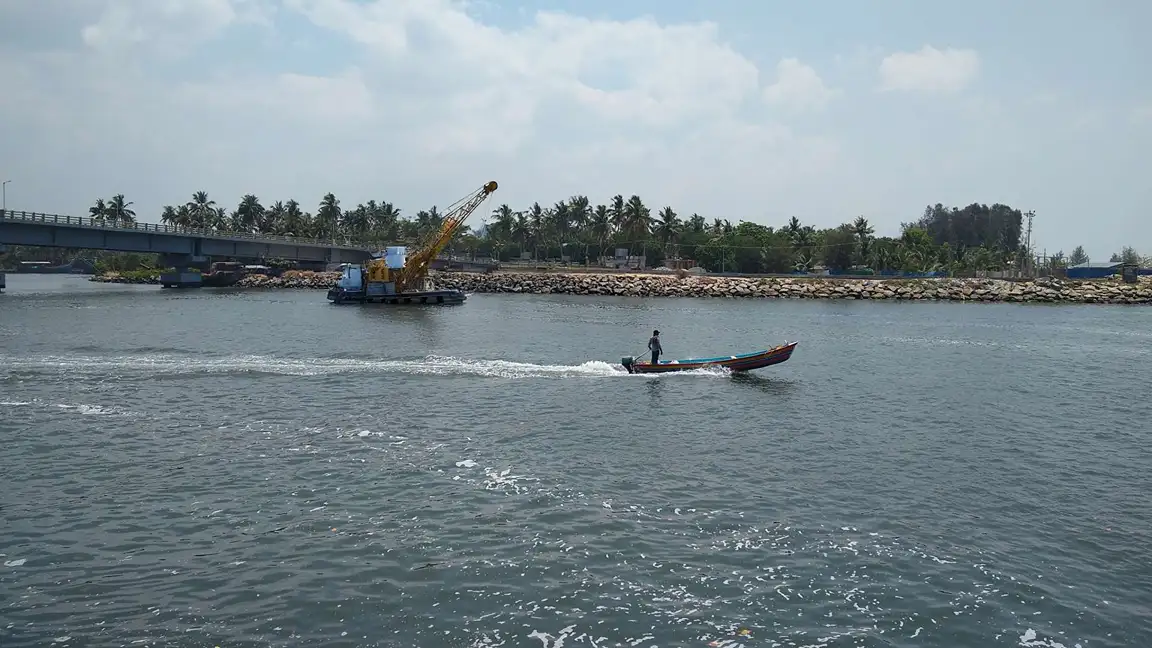Introduction
Delays in Muthalapozhi dredging operations have sparked tension among the local fishing community and raised serious concerns about regional flood safety. As sand continues to accumulate at the harbour mouth, fishermen are unable to sail, and the potential for flooding in nearby communities grows. The result is mounting pressure on authorities to act swiftly as protests loom.
The Strategic Importance of Muthalapozhi Harbour
Muthalapozhi harbour is not just a fishing hub—it’s a vital infrastructure that supports the local economy and plays a role in environmental management. When the harbour mouth remains unobstructed, fishing vessels can safely enter and exit, and excess water from inland areas can flow into the sea, aiding in flood safety.
However, heavy sandbar buildup has repeatedly choked the harbour entrance, calling for urgent Muthalapozhi dredging to maintain both navigability and water discharge.
Dredging Delay Triggers Fishermen’s Anger
Despite prior commitments, the Harbour Engineering Department has yet to commence the promised Muthalapozhi dredging. A dredger brought from Azheekal has remained idle for nine days due to unresolved mechanical issues. Frustrated fishermen, who had paused protests out of consideration for flood-risk zones, now feel betrayed by the government’s inaction.
According to Sulaiman A, Chairman of the Muthalapozhi Matsya Thozhilali Samithi, the delay is “crippling families who rely solely on fishing” and has pushed the community toward a renewed protest movement.
Defunct Dredger and Its Ripple Effect
The technical malfunction of the German-made dredger has left it unusable. While efforts are underway to repair it with local expertise, the lack of immediate progress has exacerbated tensions. Each day without Muthalapozhi dredging not only threatens fishing livelihoods but also undermines the area’s flood safety preparedness, especially with monsoon season nearing.
An official from the Harbour Engineering Department admitted the delays but assured that repairs are ongoing and dredging is expected to begin soon.
Fishermen’s Livelihoods at Risk
The inability to venture out to sea has caused economic hardship for the fishing community. With boats grounded and families facing income loss, emotions are running high. Many residents believe that their survival has been sidelined in policy decisions, as government interventions appear reactive rather than proactive.
Fishermen argue that consistent, scheduled Muthalapozhi dredging could have prevented this crisis. The repeated need for protests underscores a breakdown in communication and planning.
Wider Threat to Flood Safety
Beyond economic concerns, the delayed dredging poses a serious risk to flood safety. The clogged harbour mouth prevents proper drainage during heavy rains, raising the likelihood of inundation in low-lying areas. Given Muthalapozhi’s history of flood threats, the need for a clear and navigable waterway cannot be overstated.
Communities near the harbour are bracing for potential flood emergencies, a direct consequence of sandbar buildup and stalled dredging efforts.
Long-Term Solutions and Accountability
To prevent recurring crises, a long-term dredging and harbour maintenance plan is essential. Investing in reliable equipment, ensuring periodic Muthalapozhi dredging, and establishing accountability mechanisms can help sustain both fishing activity and flood safety.
Involving local fishers in monitoring and planning could also foster transparency and ensure that solutions align with on-ground realities.
Conclusion
The current delays in Muthalapozhi dredging are a stark reminder of how poor maintenance and slow government response can endanger both economic stability and flood safety. Fishermen’s protests reflect deeper frustrations with systemic neglect and demand urgent, sustainable action. As the community waits, the sandbar continues to grow—along with the stakes for everyone involved.
